人教版高中英语必修四 Unit 3 A taste of English humour Learning about language课件(共48张)
文档属性
| 名称 | 人教版高中英语必修四 Unit 3 A taste of English humour Learning about language课件(共48张) | 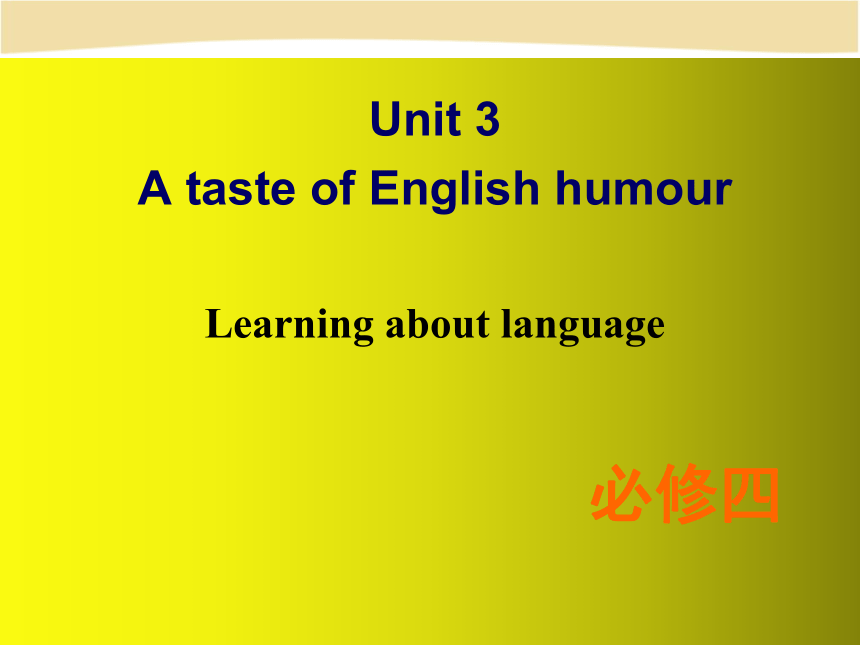 | |
| 格式 | zip | ||
| 文件大小 | 217.7KB | ||
| 资源类型 | 教案 | ||
| 版本资源 | 人教版(新课程标准) | ||
| 科目 | 英语 | ||
| 更新时间 | 2019-06-02 06:26:31 | ||
图片预览

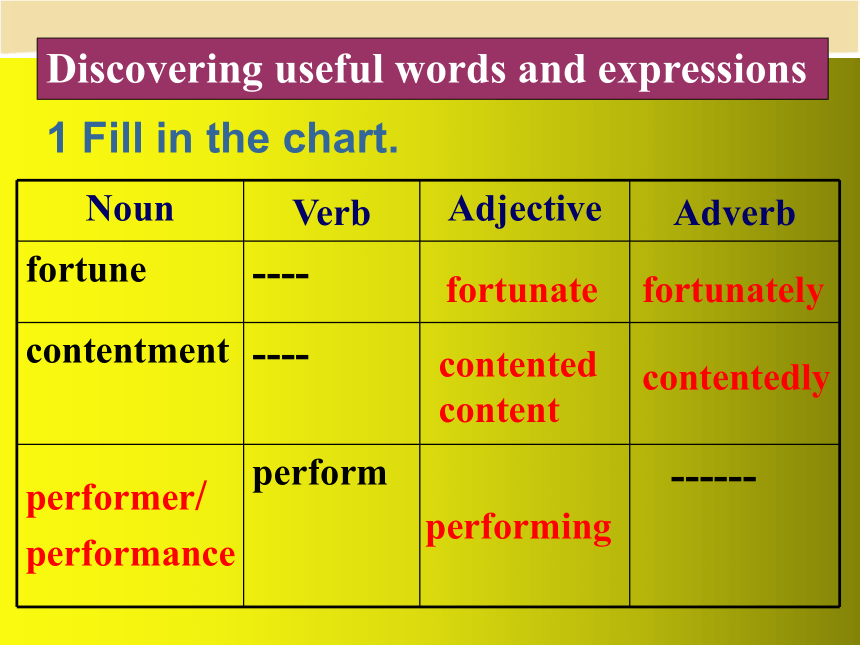
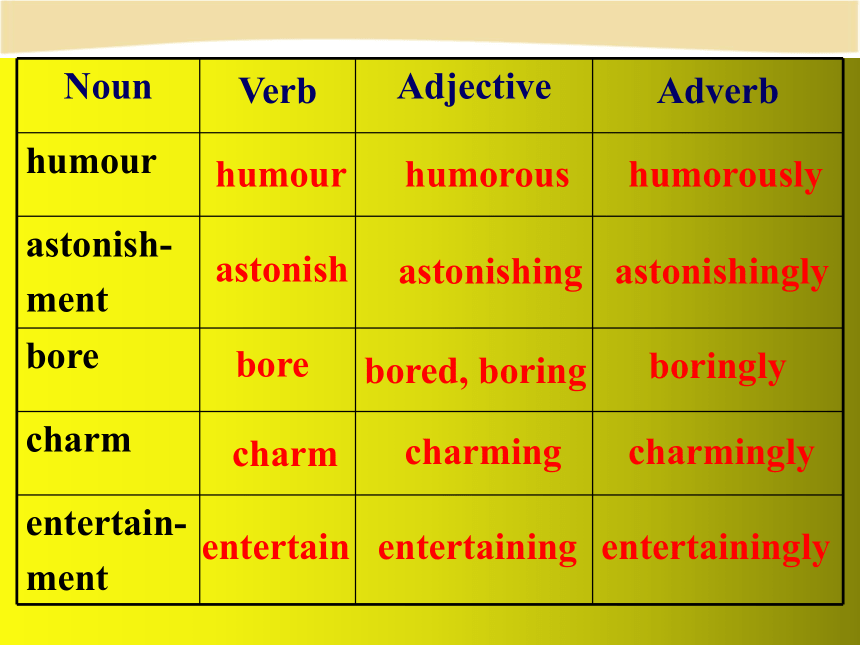
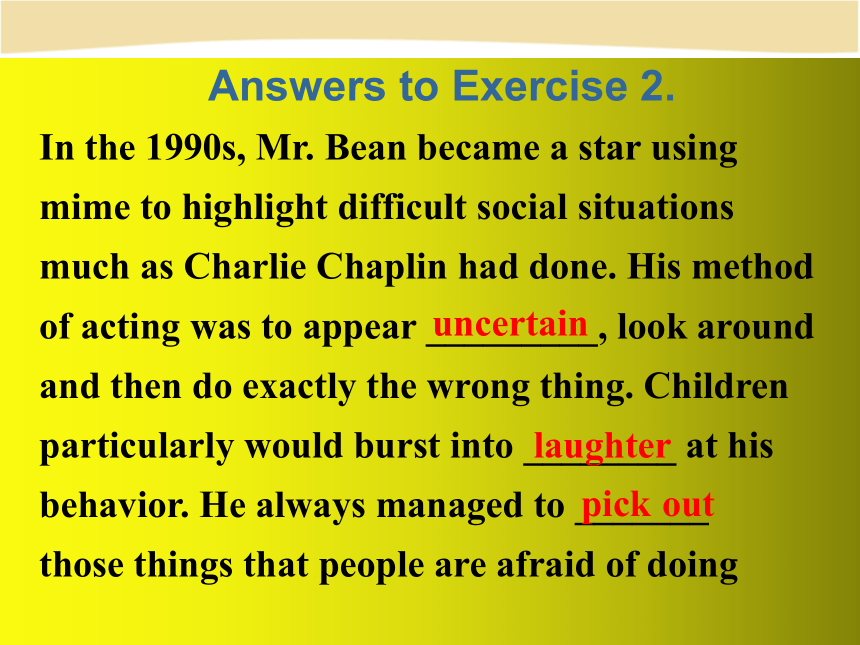
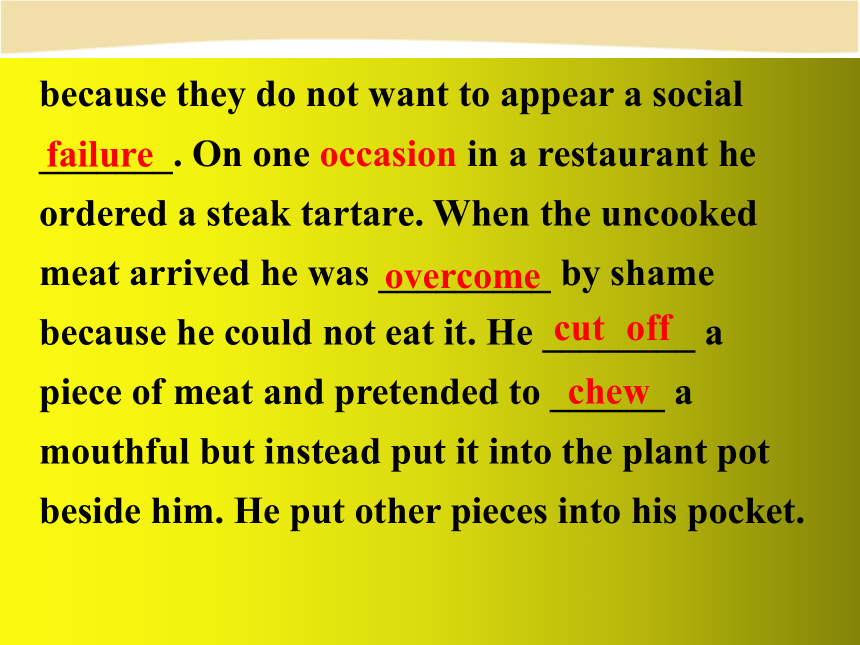
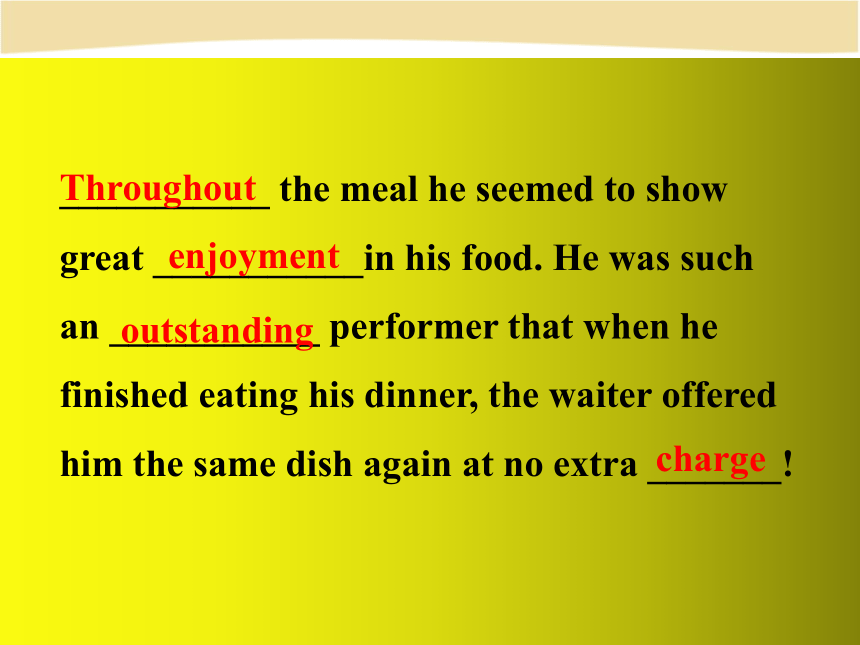
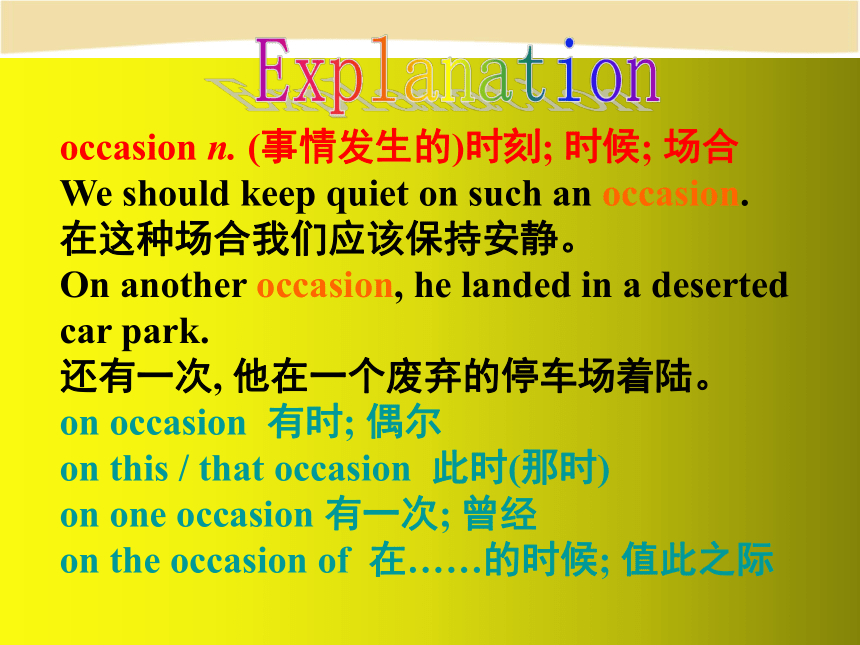
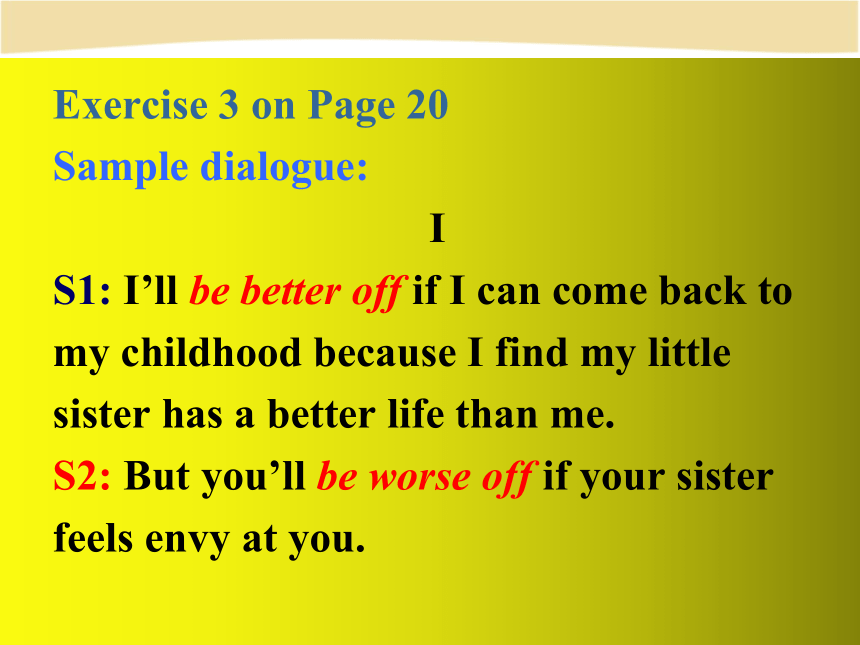
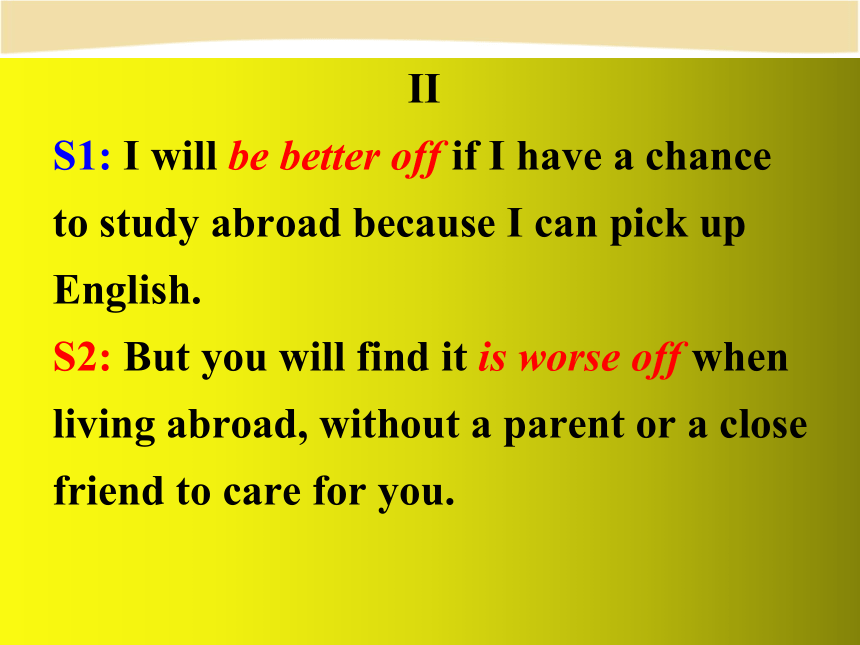
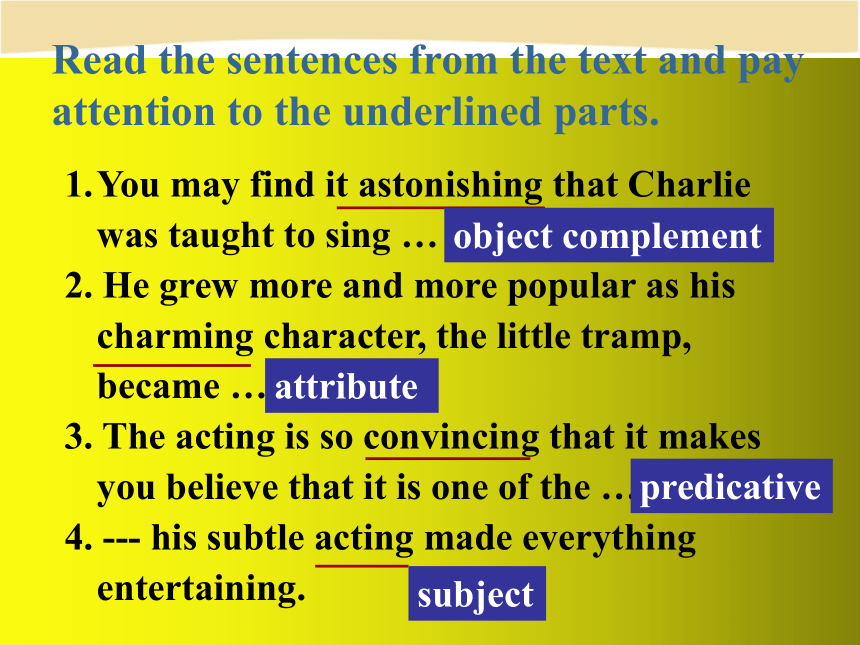
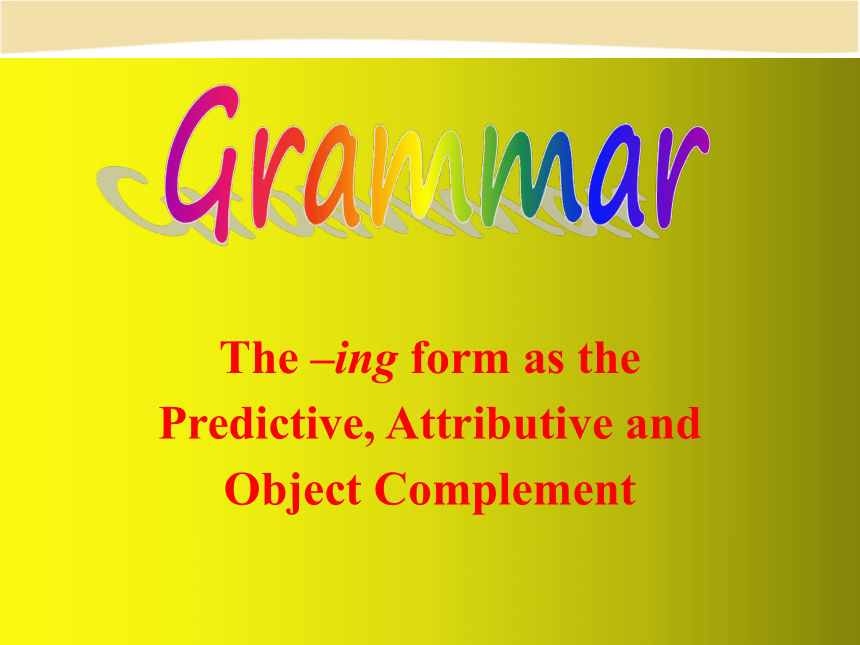
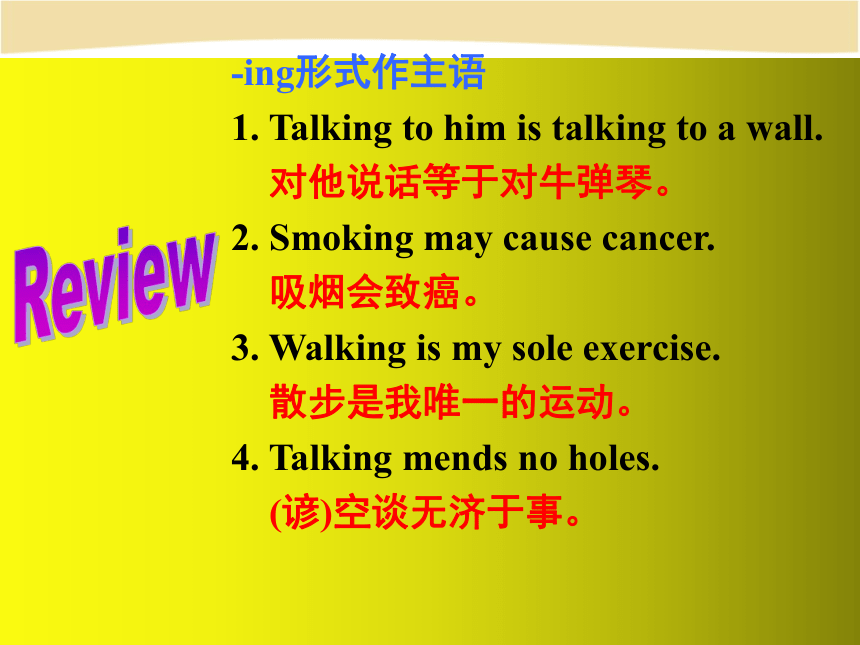
文档简介
课件48张PPT。Unit 3
A taste of English humour
Learning about language必修四fortunatefortunatelycontented
contentcontentedlyperformer/
performanceperformingDiscovering useful words and expressions 1 Fill in the chart.humourhumoroushumorouslyastonishastonishingastonishinglyborebored, boringboringlycharmcharmingcharminglyentertainentertainingentertaininglyIn the 1990s, Mr. Bean became a star using
mime to highlight difficult social situations
much as Charlie Chaplin had done. His method
of acting was to appear _________, look around
and then do exactly the wrong thing. Children
particularly would burst into ________ at his
behavior. He always managed to _______
those things that people are afraid of doing uncertainlaughterpick outAnswers to Exercise 2.because they do not want to appear a social
_______. On one occasion in a restaurant he
ordered a steak tartare. When the uncooked
meat arrived he was _________ by shame
because he could not eat it. He ________ a
piece of meat and pretended to ______ a
mouthful but instead put it into the plant pot
beside him. He put other pieces into his pocket. failureovercomecut offchew___________ the meal he seemed to show
great ___________in his food. He was such
an ___________ performer that when he
finished eating his dinner, the waiter offered
him the same dish again at no extra _______!Throughoutenjoymentoutstandingchargeoccasion n. (事情发生的)时刻; 时候; 场合
We should keep quiet on such an occasion.
在这种场合我们应该保持安静。
On another occasion, he landed in a deserted
car park.
还有一次, 他在一个废弃的停车场着陆。
on occasion 有时; 偶尔
on this / that occasion 此时(那时)
on one occasion 有一次; 曾经
on the occasion of 在……的时候; 值此之际ExplanationExercise 3 on Page 20
Sample dialogue:
I
S1: I’ll be better off if I can come back to
my childhood because I find my little
sister has a better life than me.
S2: But you’ll be worse off if your sister
feels envy at you. II
S1: I will be better off if I have a chance
to study abroad because I can pick up
English.
S2: But you will find it is worse off when
living abroad, without a parent or a close
friend to care for you. Read the sentences from the text and pay attention to the underlined parts.You may find it astonishing that Charlie was taught to sing …
2. He grew more and more popular as his charming character, the little tramp, became …
3. The acting is so convincing that it makes you believe that it is one of the …
4. --- his subtle acting made everything entertaining.object complementattributepredicativesubjectThe –ing form as the Predictive, Attributive and Object ComplementGrammar-ing形式作主语
1. Talking to him is talking to a wall.
对他说话等于对牛弹琴。
2. Smoking may cause cancer.
吸烟会致癌。
3. Walking is my sole exercise.
散步是我唯一的运动。
4. Talking mends no holes.
(谚)空谈无济于事。Review-ing形式作宾语
5. I suggest bringing the meeting to an end.
我建议结束会议。
6. He admitted taking the money.
他承认钱是他拿的。
7. I couldn’t help laughing.
我禁不住笑了起来。
8. Your coat needs brushing.
你的大衣需要刷一下。1. 单个动词的-ing形式作定语位于
被修饰名词的前面, 既可以表示被修饰
者的作用或功能, 也可以表示被修饰者
的动作或状态。
如:
building materials
= materials for building 建筑材料-ing形式作定语drinking water
= water for drinking 饮用水
a walking stick
= a stick for walking 手杖
a reading room
= a room for reading 阅览室
a writing desk
= a desk for writing 写字台 tiring music
= music that is tiring 烦人的音乐
a surprising result
= a result that is surprising
一个惊人的结果
2. –ing 形式短语作定语时, 放在所修饰的
名词之后, 并且在意思上相当于一个
定语从句。如:They lived in a room facing the street.
= They lived in a room that faces the street.
他们住在一间面朝街的房子。
The man standing there is Peter’s father.
= The man who is standing there is Peter’s
father. 站在那儿的那个人是彼得的父亲。
Anybody swimming in this river will be fined.
= Anybody who is swimming in this river
will be fined.
在这条河里游泳的任何一个人都会被罚款。
3. -ing形式短语也可以用作非限制定语,
相当于一个非限制性定语从句, 这时,
它与句子其他部分用逗号分开。如:
His brother, working as a teacher, lives in
Beijing.
= His brother, who is working as a teacher,
lives in Beijing.
他那个当教师的哥哥住在北京。The apple tree, swaying gently in the
breeze, had a good crop of fruit.
= The apple tree, which was swaying
gently in the breeze, had a good crop
of fruit.
那棵苹果树硕果累累, 在微风中轻轻摇曳。1. 动词-ing形式作宾语补足语常放在
宾语后面, 表示一个正在进行的主动性
的动作, 强调一个过程或一种状态。如:
When we returned to the school, we
found a stranger standing at the entrance.
当我们回到学校时, 发现一个陌生人
站在大门口。-ing形式作宾语补足语We found the cat eating a mouse.
我们发现那只猫正在吃老鼠。
I found a bag lying on the ground.
我发现地板上放着一个包。
The boss kept the workers working
the whole night.
那老板让工人整夜地工作。2. 当主句转换为被动结构时, 原来作
宾语补足语的动词-ing形式便转换为
主语补足语。如:
They found the result very satisfying.
= The result is found very satisfying.
这个结果很令人满意。They heard him singing in the next room.
= He was heard singing in the next room.
有人听到他在隔壁房间唱歌。
We mustn’t keep them waiting.
= They mustn’t be kept waiting.
千万不能让他们等。3. 能用-ing形式作宾语补足语的几类动词:
表示感觉和心理状态的动词, 常见的有see,
hear, feel, smell, find, notice, observe, look at,
listen to等。如:
We saw a light burning in the window.
I felt somebody patting me on the shoulder.
Can you smell anything burning?
As he spoke, he observed everybody looking at
him curiously.
Listen to the birds singing.
I didn’t notice him waiting.2) 表示指使意义的动词, 常见的有 have, set,
keep, get, catch, leave等。如:
I won’t have you doing that.
This set me thinking.
I’m sorry to have kept you waiting.
I can’t get the clock going again.
You won’t catch me doing that again.
你看吧, 我决不会做那种事了。
4. see, hear, feel, watch等动词之后用-ing形式.
和动词不定式作宾语补足语的区别:
① 前者表示动作正在进行, 而后者表示
(或强调) 动作从开始到结束的全过程。如:
We passed by the classmates and saw
the teacher making the experiment.
我们走过教室, 看见老师在做实验。
(只在走过教室的刹那间, 看见老师正在做实验)We sat for an hour and watched the teacher
make the experiment.
我们坐了一个小时, 看老师做实验。
(一个小时之内一直在看老师作实验)
② 如果宾语补足语是短暂性动词, 动词不定式
短语表示一次动作, 而-ing形式则表示反复动作。
e.g. We heard the door slam.
We heard the door slamming. (反复动作)(一次动作)-ing形式作表语时放在系动词之后, 用来泛指
某种动作或行为, 以说明主语的身份、性质或
情况。如:
Her hobby is painting. 她的业余爱好是画画。
My job is looking after the children.
我的工作就是照顾这些孩子。
His concern for his mother is most touching.
他对母亲的关爱很感人。-ing形式作表语The ___ boy was last seen ___ near the
bank of the lake.
A. missing; playing B. missing; play
C. missed; played D. missed; to play
解析: missing是形容词, 作boy的定语,
意思是“失踪的”。 was last seen playing
表示被看见时正在玩。A例题解析2. Mr. Smith, ___ of the ___ speech,
started to read a novel.
A. tired; boring B. tiring; bored
C. tired; bored D. tiring; boring
解析: 此题考查现在分词与过去分词的区别。
tired, moved, interested excited 等过去分词
叙述的是人的本身感受; tiring, moving,
interesting, exciting等现在分词叙述的是某
一物或事情给予人的感受。A3. When we watched the national flag
___ in the Olympic Games on TV,
we raised a cheer.
A. rise B. being risen
C. raised D. being raised
解析: 本题考查分词作补语, rise是不及物动词,
先排除A、B两项, 国旗是被人们升起的,
应该用分词的被动形式, 句意为: 当看到电视中
奥林匹克运动会上国旗正在被升起时, 我们
欢呼起来。D4. We sat there, ____with what we listened
to.
A. satisfying B. to satisfy
C. contented D. content
解析: 本题考查动词用法。satisfied
表示“感到满意的”, 把A、B两项排除;
content 既是形容词, 又是动词,
be contented with “对……满足”。D5. He was in hospital for six months. He felt as if he was ______ from the outside world.
A. cut out B. cut off
C. cut up D. cut through
解析:B。cut out的意思是“切下;删除”,cut off意思是“切断;使(人、城镇)孤立”,cut up的意思是“切碎”,cut through的意思是“穿越”。6. — Why did you go back to the shop? — I left my son _______ there. ???? A. wait B. to wait ???? C. waiting D. waits解析:C。本题考查分词作补语,leave 在这意思是“让…处于…状态”。ExercisesShe was offered the ______(lead) role in the
new film.
2. Seeing the sun ______(rise) above the surface of the sea, all of us began to take photos.
3. As the stone was too heavy to move, I left it _____ (lie) on the ground.
4. —Haven’t you seen the sign, _______ (read)
“NO PHOTOS”? ?—I’m really sorry I didn’t.
5. The comments which he made ___________
(concern) marketing bothered his boss greatly.Fill in the blanks with the correct form of each given word.leading rising lying reading concerning 1. I can’t imagine Billy _______ a motorbike.
2. Did you hear the someone downstairs
________ at the door?
3. Frank is very good at telling funny jokes. He
can be very ________.
4. You can’t stop me ______ what I want. Complete the sentences with a word from the box.astonish, depress, play, do, ride, amuse, knockridingknockingamusingdoing5. You may find it __________ that he made
progress in such a short time.
6. Most people consider it _________ that it
keeps raining for a whole week.
7. When I came out of the theatre, I noticed a
group of children _______ musical
instruments across the street.astonishingdepressingplaying A cook will be immediately fired if he is
found _____ in the kitchen.
A. smoke B. smoking
C. to smoke D. smoked
2. The manager discussed the plan that they
would like to see _____ the next year.
A. carry out B. carrying out
C. carried out D. to carry outB C 单项选择3. I can hardly imagine Peter _______ across the
Atlantic Ocean in five days.
A. sail B. to sail C. sailing D. to have sailed
4. When we got back from the cinema, we
found the lamp_______ but the door _______.
A. being on; shut B. burning; shutting
C. burning; shut D. on; shuttingC C 5. There was a terrible noise ____ the sudden
burst of light.
A. followed B. following
C. to be followed D. being followed
6. Tell Mary that there’s someone ____ for her
at the door.
A. waiting B. waited C. waits D. to wait
7. The _______ waiter came up to us and said,
“You are welcome.”
A. smiling B. smiled C. smile D. to smileB A A 8. The result of the test was rather ______.
A. disappointed B. disappointing
C. being disappointed D. disappoint
9. People ____ in the city do not know the
pleasure of country life.
A. live B. to live C. lived D. living
10. The library’s study room is full of students
____ for the exam.
A. busily prepared B. busy preparing
C. busily prepare D. are busily preparingB D B 11. It’s really terrible to have a bus _____
another, which will cause an _____
accident.
A. knocked up; astonished
B. bumped into; astonishing
C. knocked into; astonished
D. bumped up; astonishingB 12. New Zealand is an _____ country;
you can hear ____ everywhere.
A. English spoken; English-speaking
B. English-spoken; spoken English
C. English-speaking; speaking English
D. English-speaking; English spokenD 13. When I came in, I saw Dr. Li _____ a patient.
A. examine B. examing
C. to exam D. examined
14. When he awoke, he found himself _____ by
an old woman.
A. looked after B. be looked after
C. being looked after D. be looking after
15. Sitting by her side, I could feel her heart
_________.
A. beaten B. to beat
C. beating D. to be beatingC C B Homework1. Summarize the rules of the
grammar in your own way.
2. Finish the exercises of
“Discovering useful structures”
on Page 21.
A taste of English humour
Learning about language必修四fortunatefortunatelycontented
contentcontentedlyperformer/
performanceperformingDiscovering useful words and expressions 1 Fill in the chart.humourhumoroushumorouslyastonishastonishingastonishinglyborebored, boringboringlycharmcharmingcharminglyentertainentertainingentertaininglyIn the 1990s, Mr. Bean became a star using
mime to highlight difficult social situations
much as Charlie Chaplin had done. His method
of acting was to appear _________, look around
and then do exactly the wrong thing. Children
particularly would burst into ________ at his
behavior. He always managed to _______
those things that people are afraid of doing uncertainlaughterpick outAnswers to Exercise 2.because they do not want to appear a social
_______. On one occasion in a restaurant he
ordered a steak tartare. When the uncooked
meat arrived he was _________ by shame
because he could not eat it. He ________ a
piece of meat and pretended to ______ a
mouthful but instead put it into the plant pot
beside him. He put other pieces into his pocket. failureovercomecut offchew___________ the meal he seemed to show
great ___________in his food. He was such
an ___________ performer that when he
finished eating his dinner, the waiter offered
him the same dish again at no extra _______!Throughoutenjoymentoutstandingchargeoccasion n. (事情发生的)时刻; 时候; 场合
We should keep quiet on such an occasion.
在这种场合我们应该保持安静。
On another occasion, he landed in a deserted
car park.
还有一次, 他在一个废弃的停车场着陆。
on occasion 有时; 偶尔
on this / that occasion 此时(那时)
on one occasion 有一次; 曾经
on the occasion of 在……的时候; 值此之际ExplanationExercise 3 on Page 20
Sample dialogue:
I
S1: I’ll be better off if I can come back to
my childhood because I find my little
sister has a better life than me.
S2: But you’ll be worse off if your sister
feels envy at you. II
S1: I will be better off if I have a chance
to study abroad because I can pick up
English.
S2: But you will find it is worse off when
living abroad, without a parent or a close
friend to care for you. Read the sentences from the text and pay attention to the underlined parts.You may find it astonishing that Charlie was taught to sing …
2. He grew more and more popular as his charming character, the little tramp, became …
3. The acting is so convincing that it makes you believe that it is one of the …
4. --- his subtle acting made everything entertaining.object complementattributepredicativesubjectThe –ing form as the Predictive, Attributive and Object ComplementGrammar-ing形式作主语
1. Talking to him is talking to a wall.
对他说话等于对牛弹琴。
2. Smoking may cause cancer.
吸烟会致癌。
3. Walking is my sole exercise.
散步是我唯一的运动。
4. Talking mends no holes.
(谚)空谈无济于事。Review-ing形式作宾语
5. I suggest bringing the meeting to an end.
我建议结束会议。
6. He admitted taking the money.
他承认钱是他拿的。
7. I couldn’t help laughing.
我禁不住笑了起来。
8. Your coat needs brushing.
你的大衣需要刷一下。1. 单个动词的-ing形式作定语位于
被修饰名词的前面, 既可以表示被修饰
者的作用或功能, 也可以表示被修饰者
的动作或状态。
如:
building materials
= materials for building 建筑材料-ing形式作定语drinking water
= water for drinking 饮用水
a walking stick
= a stick for walking 手杖
a reading room
= a room for reading 阅览室
a writing desk
= a desk for writing 写字台 tiring music
= music that is tiring 烦人的音乐
a surprising result
= a result that is surprising
一个惊人的结果
2. –ing 形式短语作定语时, 放在所修饰的
名词之后, 并且在意思上相当于一个
定语从句。如:They lived in a room facing the street.
= They lived in a room that faces the street.
他们住在一间面朝街的房子。
The man standing there is Peter’s father.
= The man who is standing there is Peter’s
father. 站在那儿的那个人是彼得的父亲。
Anybody swimming in this river will be fined.
= Anybody who is swimming in this river
will be fined.
在这条河里游泳的任何一个人都会被罚款。
3. -ing形式短语也可以用作非限制定语,
相当于一个非限制性定语从句, 这时,
它与句子其他部分用逗号分开。如:
His brother, working as a teacher, lives in
Beijing.
= His brother, who is working as a teacher,
lives in Beijing.
他那个当教师的哥哥住在北京。The apple tree, swaying gently in the
breeze, had a good crop of fruit.
= The apple tree, which was swaying
gently in the breeze, had a good crop
of fruit.
那棵苹果树硕果累累, 在微风中轻轻摇曳。1. 动词-ing形式作宾语补足语常放在
宾语后面, 表示一个正在进行的主动性
的动作, 强调一个过程或一种状态。如:
When we returned to the school, we
found a stranger standing at the entrance.
当我们回到学校时, 发现一个陌生人
站在大门口。-ing形式作宾语补足语We found the cat eating a mouse.
我们发现那只猫正在吃老鼠。
I found a bag lying on the ground.
我发现地板上放着一个包。
The boss kept the workers working
the whole night.
那老板让工人整夜地工作。2. 当主句转换为被动结构时, 原来作
宾语补足语的动词-ing形式便转换为
主语补足语。如:
They found the result very satisfying.
= The result is found very satisfying.
这个结果很令人满意。They heard him singing in the next room.
= He was heard singing in the next room.
有人听到他在隔壁房间唱歌。
We mustn’t keep them waiting.
= They mustn’t be kept waiting.
千万不能让他们等。3. 能用-ing形式作宾语补足语的几类动词:
表示感觉和心理状态的动词, 常见的有see,
hear, feel, smell, find, notice, observe, look at,
listen to等。如:
We saw a light burning in the window.
I felt somebody patting me on the shoulder.
Can you smell anything burning?
As he spoke, he observed everybody looking at
him curiously.
Listen to the birds singing.
I didn’t notice him waiting.2) 表示指使意义的动词, 常见的有 have, set,
keep, get, catch, leave等。如:
I won’t have you doing that.
This set me thinking.
I’m sorry to have kept you waiting.
I can’t get the clock going again.
You won’t catch me doing that again.
你看吧, 我决不会做那种事了。
4. see, hear, feel, watch等动词之后用-ing形式.
和动词不定式作宾语补足语的区别:
① 前者表示动作正在进行, 而后者表示
(或强调) 动作从开始到结束的全过程。如:
We passed by the classmates and saw
the teacher making the experiment.
我们走过教室, 看见老师在做实验。
(只在走过教室的刹那间, 看见老师正在做实验)We sat for an hour and watched the teacher
make the experiment.
我们坐了一个小时, 看老师做实验。
(一个小时之内一直在看老师作实验)
② 如果宾语补足语是短暂性动词, 动词不定式
短语表示一次动作, 而-ing形式则表示反复动作。
e.g. We heard the door slam.
We heard the door slamming. (反复动作)(一次动作)-ing形式作表语时放在系动词之后, 用来泛指
某种动作或行为, 以说明主语的身份、性质或
情况。如:
Her hobby is painting. 她的业余爱好是画画。
My job is looking after the children.
我的工作就是照顾这些孩子。
His concern for his mother is most touching.
他对母亲的关爱很感人。-ing形式作表语The ___ boy was last seen ___ near the
bank of the lake.
A. missing; playing B. missing; play
C. missed; played D. missed; to play
解析: missing是形容词, 作boy的定语,
意思是“失踪的”。 was last seen playing
表示被看见时正在玩。A例题解析2. Mr. Smith, ___ of the ___ speech,
started to read a novel.
A. tired; boring B. tiring; bored
C. tired; bored D. tiring; boring
解析: 此题考查现在分词与过去分词的区别。
tired, moved, interested excited 等过去分词
叙述的是人的本身感受; tiring, moving,
interesting, exciting等现在分词叙述的是某
一物或事情给予人的感受。A3. When we watched the national flag
___ in the Olympic Games on TV,
we raised a cheer.
A. rise B. being risen
C. raised D. being raised
解析: 本题考查分词作补语, rise是不及物动词,
先排除A、B两项, 国旗是被人们升起的,
应该用分词的被动形式, 句意为: 当看到电视中
奥林匹克运动会上国旗正在被升起时, 我们
欢呼起来。D4. We sat there, ____with what we listened
to.
A. satisfying B. to satisfy
C. contented D. content
解析: 本题考查动词用法。satisfied
表示“感到满意的”, 把A、B两项排除;
content 既是形容词, 又是动词,
be contented with “对……满足”。D5. He was in hospital for six months. He felt as if he was ______ from the outside world.
A. cut out B. cut off
C. cut up D. cut through
解析:B。cut out的意思是“切下;删除”,cut off意思是“切断;使(人、城镇)孤立”,cut up的意思是“切碎”,cut through的意思是“穿越”。6. — Why did you go back to the shop? — I left my son _______ there. ???? A. wait B. to wait ???? C. waiting D. waits解析:C。本题考查分词作补语,leave 在这意思是“让…处于…状态”。ExercisesShe was offered the ______(lead) role in the
new film.
2. Seeing the sun ______(rise) above the surface of the sea, all of us began to take photos.
3. As the stone was too heavy to move, I left it _____ (lie) on the ground.
4. —Haven’t you seen the sign, _______ (read)
“NO PHOTOS”? ?—I’m really sorry I didn’t.
5. The comments which he made ___________
(concern) marketing bothered his boss greatly.Fill in the blanks with the correct form of each given word.leading rising lying reading concerning 1. I can’t imagine Billy _______ a motorbike.
2. Did you hear the someone downstairs
________ at the door?
3. Frank is very good at telling funny jokes. He
can be very ________.
4. You can’t stop me ______ what I want. Complete the sentences with a word from the box.astonish, depress, play, do, ride, amuse, knockridingknockingamusingdoing5. You may find it __________ that he made
progress in such a short time.
6. Most people consider it _________ that it
keeps raining for a whole week.
7. When I came out of the theatre, I noticed a
group of children _______ musical
instruments across the street.astonishingdepressingplaying A cook will be immediately fired if he is
found _____ in the kitchen.
A. smoke B. smoking
C. to smoke D. smoked
2. The manager discussed the plan that they
would like to see _____ the next year.
A. carry out B. carrying out
C. carried out D. to carry outB C 单项选择3. I can hardly imagine Peter _______ across the
Atlantic Ocean in five days.
A. sail B. to sail C. sailing D. to have sailed
4. When we got back from the cinema, we
found the lamp_______ but the door _______.
A. being on; shut B. burning; shutting
C. burning; shut D. on; shuttingC C 5. There was a terrible noise ____ the sudden
burst of light.
A. followed B. following
C. to be followed D. being followed
6. Tell Mary that there’s someone ____ for her
at the door.
A. waiting B. waited C. waits D. to wait
7. The _______ waiter came up to us and said,
“You are welcome.”
A. smiling B. smiled C. smile D. to smileB A A 8. The result of the test was rather ______.
A. disappointed B. disappointing
C. being disappointed D. disappoint
9. People ____ in the city do not know the
pleasure of country life.
A. live B. to live C. lived D. living
10. The library’s study room is full of students
____ for the exam.
A. busily prepared B. busy preparing
C. busily prepare D. are busily preparingB D B 11. It’s really terrible to have a bus _____
another, which will cause an _____
accident.
A. knocked up; astonished
B. bumped into; astonishing
C. knocked into; astonished
D. bumped up; astonishingB 12. New Zealand is an _____ country;
you can hear ____ everywhere.
A. English spoken; English-speaking
B. English-spoken; spoken English
C. English-speaking; speaking English
D. English-speaking; English spokenD 13. When I came in, I saw Dr. Li _____ a patient.
A. examine B. examing
C. to exam D. examined
14. When he awoke, he found himself _____ by
an old woman.
A. looked after B. be looked after
C. being looked after D. be looking after
15. Sitting by her side, I could feel her heart
_________.
A. beaten B. to beat
C. beating D. to be beatingC C B Homework1. Summarize the rules of the
grammar in your own way.
2. Finish the exercises of
“Discovering useful structures”
on Page 21.
同课章节目录
